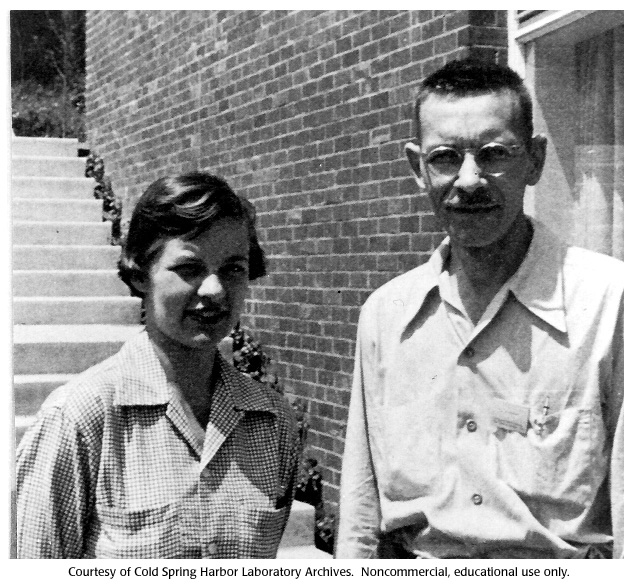Gallery 18: Alfred Hershey and Martha Chase, 1953

Alfred Hershey and Martha Chase at Cold Spring Harbor, 1953.
martha chase, cold spring harbor, alfred hershey
- ID: 16406
- Source: DNALC.DNAFTB
Related Content
16020. Alfred Hershey and Martha Chase, 1952
Bacteria and viruses have DNA too.
16417. Video 18: Al Hershey, clip 1
In this interview from 1991, Al Hershey describes the experimental approach used in the famous "blender experiment."
16597. Gallery 27: Alfred Hershey and Seymour Benzer, 1953
Alfred Hershey and Seymour Benzer at Cold Spring Harbor Laboratory, 1953 Symposium.
16419. Biography 18: Alfred Day Hershey (1908-1997)
Alfred Hershey was a phage geneticist who, with his research assistant, Martha Chase, did one of the most famous experiments in molecular biology. The "blender" experiment proved that DNA carried genetic information.
16404. Gallery 18: E. B. Lewis, C. C. Lindegren, Alfred Hershey and Joshua Lederberg, 1951
1951 Cold Spring Harbor Symposium, (L-R): E. B. Lewis, C. C. Lindegren, Alfred Hershey and Joshua Lederberg.
16408. Gallery 18: Raymond Appleyard, George Bowen, Martha Chase, June Dixon, 1953
Relaxing during a break at the 1953 Cold Spring Harbor Symposium on Viruses: (L-R) Raymond Appleyard, George Bowen, Martha Chase, June Dixon.
16407. Gallery 18: Martha Epstein Chase
Martha Epstein Chase.
16411. Gallery 18: Alfred Hershey, 1960
Alfred Hershey working in the lab, 1960.
16395. Animation18: Bacteria and viruses have DNA too.
Joshua Lederberg worked with bacterial genetics while Alfred Hershey showed that DNA is responsible for the reproduction of new viruses in a cell.
16409. Gallery 18: Alfred Hershey, 1969
Alfred Hershey receiving the 1969 Nobel Prize in Physiology or Medicine.












